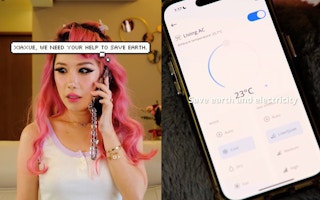An advertisement by a Singapore consumer electronics company that claims consumers can “save Earth” by buying its energy-efficient airconditioners has been banned by the country’s advertising watchdog for greenwashing.
To continue reading, subscribe to Eco‑Business.
There's something for everyone. We offer a range of subscription plans.
- Access our stories and receive our Insights Weekly newsletter with the free EB Member plan.
- Unlock unlimited access to our content and archive with EB Circle.
- Publish your content with EB Premium.
In a video version of a social media campaign for Prism+ Zero Smart Aircon units, which has since been taken down after the ban, local influencer Xiaxue, real name Wendy Cheng, is called by a fictional president who asks for her help to “save the earth”. In response, Xiaxue puts on winter clothing, sets the airconditioner to 23°C, and snuggles under a blanket. “Save Earth and electricity with 5 ticks energy saving,” reads the caption. The 5 ticks refers to Singapore’s classification system for the energy efficiency of electrical appliances, with 5 ticks being the highest rating.
In response to a complaint about the campaign, Singapore’s advertising watchdog ruled that the video misled consumers and Prism+ was asked to remove the ad, which has been running on Instagram. The advertiser has complied.
The ruling marks the first time that an advertising campaign in Singapore, or anywhere in Asia, has been banned for greenwashing.
In a statement shared with Eco-Business, Professor Ang Peng Hwa, chairman of the Advertising Standards Authority of Singapore (ASAS) said the ad was “not acceptable” for claiming that energy-guzzling airconditioners can save the Earth, irrespective of how much energy this model can save, and was misleading.
ASAS ruled that the ad flouted Singapore’s advertising code, in particular a section on “truthful presentation”, which demands that advertising does not “mislead in any way by inaccuracy, ambiguity, exaggeration or omission.”
The watchdog also told the company, which was founded in 2017 by Singaporean Jonathan Tan, that any energy savings claims should be substantiated by getting its products and other comparable models made by competitors tested by a third-party “in conditions that are applicable to the local context.”








